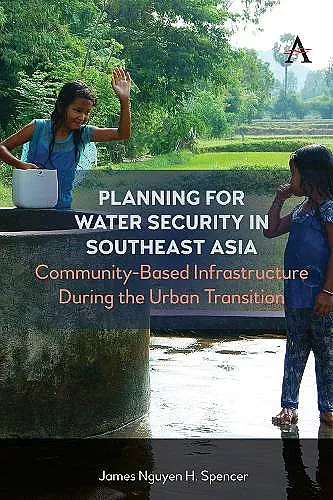Planning for Water Security in Southeast Asia
Community-Based Infrastructure During the Urban Transition
Format:Hardback
Publisher:Anthem Press
Published:13th Sep '22
Should be back in stock very soon

Examines the daily urban infrastructure needs of citizens, especially under rapid growth contexts, as a window into the broader concern with participation in governance, development, and visioning the future.
This book examines how four communities in the rapidly developing cities of Southeast Asia have creatively solved growing environmental problems. It’s description of how community-level collaboration in Vietnam, Cambodia and Indonesia provide new ways for thinking about how marginalized people can co-create their own equitable and efficient infrastructure.
The central premise of the book, as well as the key lesson for readers is that infrastructure is the backbone of democracy. Without it, the process of collective governance fades beyond the immediacy of daily life. Using this premise, the book describes several case studies from Southeast Asia – rapidly urbanizing communities in Gresik, Indonesia; Can Tho, Viet Nam; Phnom Penh, Cambodia and Ha Noi, Viet Nam –that illustrate the embeddedness of highly localized governance structures in the built infrastructure. These four case studies illustrating similar community phenomena across differing social, political, and cultural context will encourage readers to consider the material, built environment stakes underlying participatory democracy as well as the importance of democratic participation in the visioning, building and management of large-scale urban projects.
This book is a reader-friendly presentation of the details of professional standards (i.e., FASB’s Accounting Codification Standard 820 and IFRS 13: Fair Value Measurement) and the practical issues in Fair Value Measurement and Disclosure, including the differences between GAAP Standards and IFRS Standards — Choice
"This is a beautifully written book about an urgent topic: how marginalized communities are accessing water in rapidly urbanizing contexts. Spencer is masterful at balancing the messiness of case studies while not losing sight of what we can learn from these cases and possibly generalize and scale. The book will soon become required reading for practitioners and scholars alike interested in contexts where communities, civil society, and the state, to varying degrees, are struggling to innovate the delivery of core urban services where municipal financial resources are limited and urban populations are continuing to grow.”— Victoria A. Beard, Professor and Associate Dean for Research Initiatives, College of Architecture, Art, and Planning, Cornell University, USA.
"A cutting-edge framework linking community-level institutions with access to water in peri-urban areas. This book is a must-read for scholars and practitioners interested in inclusive urban policies."— Shabbir Cheema, former director of the UN Development Program and senior fellow of the East-West Center and Harvard Kennedy School.
"Spencer has produced a groundbreaking book, focusing on four case studies from three post-Cold War South-east Asian countries in the Global South, highlighting the importance of rural communities in developing alternatives to policies for community development and management dictated from on high; as well as managing new water infrastructure gaps that accompany rapid urbanization."— Edmond J. Keller, University of California Los Angeles, USA.
“This book provides a vivid explanation of how local community institutions and collective governance play a fundamental role in shaping, not only a democratic process to meet their needs for public infrastructure and services but also a public policy making process for the urban sector in urbanizing cities in Southeast Asia. It is an invaluable resource for all readers from academicians, and development practitioners, down to community leaders to understand ways that community problems can be solved. The book comes just in time when constraints in local development finance and service delivery are countering one another in the urbanizing world. Thus, it is a useful reference for policy and decision-makers to take into account a proactive role in responding to the local needs.”— H.E. MENG Bunnarith, Ph.D., Deputy Director-General of Land Management and Urban Planning, and Deputy Secretary-General of National Committee on Land Management and Urban Planning, Ministry of Land Management, Urban Planning and Construction, Cambodia.
James Spencer’s book develops a framework of interoperability in hybrid systems to critically investigate how community-based small-scale service providers interact with and complement big infrastructures to allow residents to maintain their water access entitlements in peri-urban geographies experiencing changing environments, economies, institutions, assets, and consumption patterns. The framework is applied to interrogate models of water infrastructure governance and supply provision across peri-urban, post–Cold War Southeast Asia in Gresik (Indonesia), Can Tho and Ha Noi (Vietnam), and Phnom Penh (Cambodia). —Nidhi Subramanyam, Journal of the American Planning Association
ISBN: 9781839984013
Dimensions: 229mm x 153mm x 26mm
Weight: 454g
226 pages